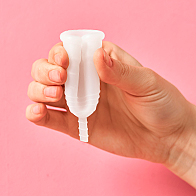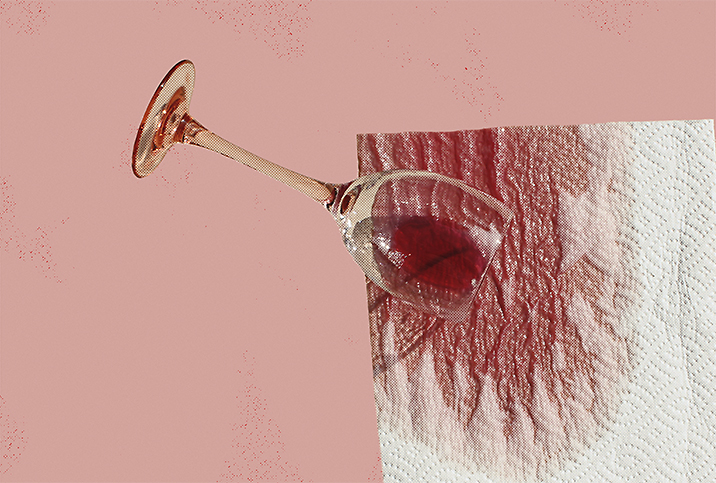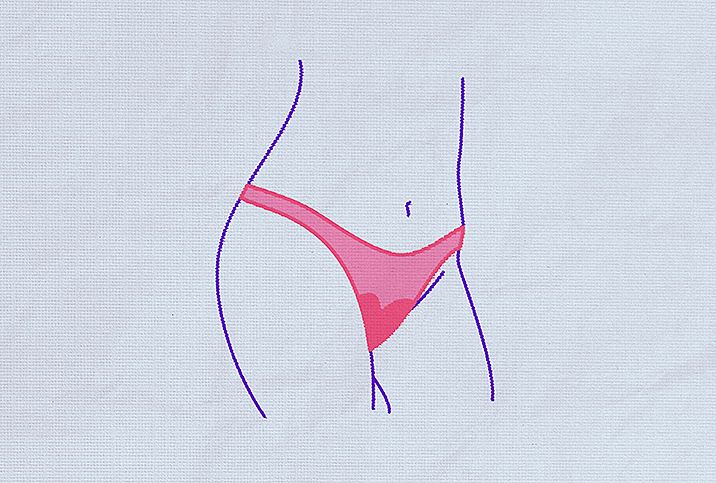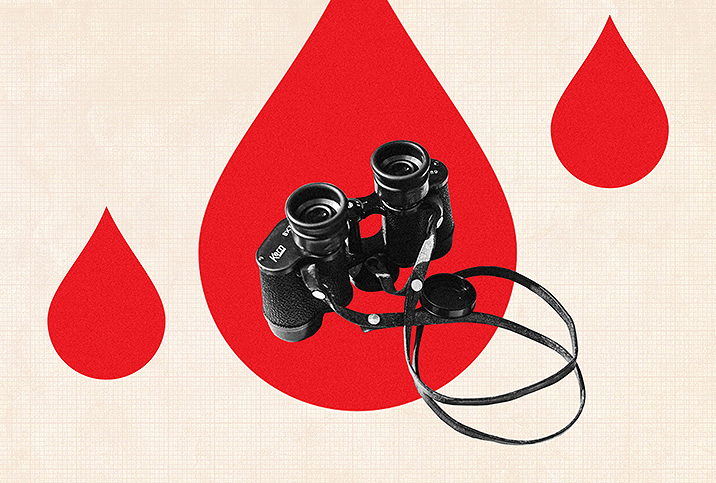9 Ways to Handle a Heavy Period

Periods are a pain for most people. It's hard to live your best life when you're tired, bloated, cramping and perpetually hangry. But if your period is more than a nuisance and heavy bleeding is significantly interfering with your day-to-day, something may not be right.
What's considered "heavy bleeding" can vary from one person to another. Generally, it entails losing more than 80 milliliters of blood during your period.
Of course, most of us use measuring cups for baking brownies, not measuring blood loss. Some practical indications of heavy flow include regularly soaking a pad or tampon once every two hours, filling a menstrual cup three times or more per day, feeling faint or light-headed, seeing large clots (bigger than a quarter), or periods that last longer than a week.
According to Vonne Jones, M.D., FACOG, who provides care to women at Total Women's Care in Houston, Texas, the most common reasons for regular heavy bleeding are uterine fibroids or polyps.
"Uterine fibroids are smooth, muscled growths within the uterus. Polyps are usually like fleshy, small, benign ropes within the uterus that typically happen within the uterine lining—which is what you shed when you have your cycle—muscle lining, or the outside or subserosa lining," Jones explained.
Hormone imbalances or dietary deficiencies can cause temporary or consistent heavy bleeding, as well.
'Sometimes, just like you have computer glitches, you have hormonal glitches, and you'll have one irregular cycle, and then your cycle will normalize.'
"Interpreting your period can be a bit like Goldilocks," said Maritza Worthington, FDN-P, CHNC. "If a flow is too light, it can indicate not enough good fats in the diet or low hormone production, whereas a heavy flow (aka menorrhagia) can indicate an imbalance of hormones, nutrient deficiencies or deeper issues."
When it comes to hormone imbalances, excessive cortisol (a stress hormone), estrogen dominance, low progesterone in relation to estrogen, or under- or overactive thyroid can be to blame.
Iron-deficiency anemia, a clotting disorder like von Willebrand disease (hemophilia), adenomyosis and polycystic ovary syndrome (PCOS) can cause heavy bleeding, too. Rarely, uterine or cervical tumors may be responsible.
Some people experience menstrual changes as a side effect immediately after getting a vaccine or using an emergency contraceptive (Plan B). But in these instances, everything usually goes back to normal the following month.
Jones advises seeing a doctor if your period is heavier than usual for three months or more.
"Sometimes, just like you have computer glitches, you have hormonal glitches, and you'll have one irregular cycle, and then your cycle will normalize," said Jones. "But if you say this has happened for a period of more than three months, or you have bleeding in between your cycles, or you've gotten to the point where you're just saturating pads and tampons, continuously bleeding, bleeding through clothes or having accidents at night, these would be indications to contact your provider for further testing."
Treatment will depend on your condition, but the following are some common coping strategies.
1. Menstrual cup
"If your flow is often quite heavy, then you might want to use a menstrual cup," suggested Donald Grant, M.B., Ch.B., DRCOG, MRCGP, Dip.orth.med, clinical lead at The Independent Online Pharmacy. "They can usually catch more blood than tampons or pads, so while they won't reduce the flow, it'll mean you can go longer between visiting the bathroom."
Cups are also less likely to leak than disposable pads and tampons, and may help you quantify your flow.
If you're not keen on the cup, then reusable, leakproof period underwear is another option to improve comfort and reduce the risk of accidents. For heavy-flow days, many women recommend using leakproof panties along with a tampon or pad.
2. NSAIDs
One of the simplest options is to take an over-the-counter anti-inflammatory medication (NSAID) such as Motrin, Naproxen or Ibuprofen, provided you're not allergic.
"If your cycle is coming every 28 days, and you expect a cycle within the next 48 hours, the recommendation is to do Motrin over the counter, usually 400 to 600 [mg] every eight hours. That would decrease the amount of bleeding and cramping that you have by about 30 percent," Jones said.
NSAIDs work by decreasing the production of prostaglandins, which are chemical compounds that stimulate uterine contractions and increase blood flow and cramping.
If you use an NSAID, be sure to take it with food to avoid getting an upset stomach.
3. Iron
"You're also at risk of anemia when you're bleeding heavily, which can make you feel more tired, weak and dizzy," said Grant. "So it's often a good idea to take an iron supplement and eat more iron-rich foods during your period."
High doses of iron can cause dangerous side effects, so talk to your doctor before starting any supplement regimen. Iron-rich foods include red meat, seafood, beans, nuts, iron-fortified grains, peas, and dark-green leafy vegetables, such as spinach.
4. Other supplements and lifestyle changes
"As for lifestyle changes, try to incorporate 30 minutes of cardio into your daily routine, cut down on inflammatory foods like alcohol, caffeine and dairy, and try adding in supplements," said Suzie Welsh Devine, R.N., MSN, and founder of Binto. "Over-the-counter supplements are a great way to help decrease inflammation and regulate your period flow. For this, at Binto, we recommend DHA/EPA to support the health of the uterus, balance hormones and decrease inflammation."
Other supplements that may promote menstrual health and assuage PMS symptoms include chasteberry, ginkgo biloba, magnesium and ginger. Your doctor can recommend the best supplements for you.
5. Hormone testing
Since hormones are a common cause of heavy or otherwise irregular periods, testing is often recommended, particularly if you have other symptoms of a hormonal imbalance, such as rapid weight gain or loss, adult acne, excessive sweating, hair loss, depression, chronic fatigue, anxiety or insomnia.
"Hormone testing can be very helpful for differentiating between what might be an imbalance or a condition," said Worthington. "Make sure to get a full thyroid panel (TSH, total T4, and T3, free T4 and T3, reverse T3, anti-TPO, and antithyroglobulin antibodies), as well as a complete blood count (CBC) and ferritin test. Often, women will only get their TSH tested, and this doesn't show the entire conversion of thyroid hormone."
6. Birth control
"For some women, [hormonal birth control] is a way to help manage heavy and painful periods," said Welsh Devine.
The estrogen in combination hormonal birth control (the pill, patch, ring or IUD) can promote blood clotting and thickening, decreasing menstrual flow.
Taking the progestin-only pill, or "mini-pill," is another option. Unlike the combination pill, these packs don't contain any estrogen or any placebos. You take them continually, every day, without a "break" week, which can reduce bleeding or stop it altogether.
It's safe to take combination pills continuously without a break, too. But be sure to talk to your doctor first, as some pills work better on a continuous cycle than others.
Worthington said that if you currently have a copper IUD, it may be worth talking to your doctor about switching birth control types, as these can cause longer or heavier periods.
7. Tranexamic acid
"Antifibrinolytic medicines like tranexamic acid can also keep blood clots from breaking down and may reduce bleeding," Grant said.
This prescription-only medication, taken during the first four or five days of the menstrual cycle, can be a good alternative if hormonal treatments aren't an option, or for those with uterine fibroids. It's not advised for people with a history of blood clots, however.
8. GnRH agonists
Gonadotropin-releasing hormone agonist drugs (GnRH agonists) stop estrogen production in the body, thereby stopping the menstrual cycle. These may be a viable treatment option for people with uterine fibroids or endometriosis, though they're not as prevalent as other treatments.
9. Surgery
In severe cases, including when uterine polyps or fibroids are responsible for your heavy flow, your doctor may recommend surgery.
Endometrial ablation is one option, which involves using heat, an electric current, microwave energy or radio waves to remove the uterine lining, so the flow becomes lighter with each subsequent cycle. Cryoablation is another option and involves freezing off the endometrial tissue. The caveat is the latter may prevent future pregnancy.
Uterine artery embolism is a minimally invasive procedure used to remove fibroids. It involves injecting a substance into an artery in the groin to block blood flow to the fibroids. Eventually, this can reduce the size of the fibroids, resulting in lighter, less painful menses.
Myomectomies and hysterectomies are more advanced surgical options. The former involves removing fibroids while leaving the uterus intact. You can become pregnant after a myomectomy, although it may increase the risk of complications.
A hysterectomy is usually considered a last resort, as it eliminates any possibility of future pregnancy and induces early menopause.
The bottom line
"If you're soaking more than a thick pad every hour and you're passing large clots, you need to seek immediate medical attention," said Welsh Devine. "If you're tired of trying to manage heavy period flows every month, call your healthcare provider and set up an appointment. It's time to talk about options."
Periods aren't pleasant, but they shouldn't be insufferable. If yours is severely impacting your life, ask your doctor about finding a solution.
"I often like to compare [a period] to a monthly menstrual report card," said Worthington. "I truly believe our body is always communicating significant information to us about our health status, and it's up to us to read between the lines and fill in the gaps with support."




















